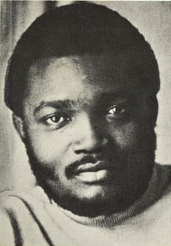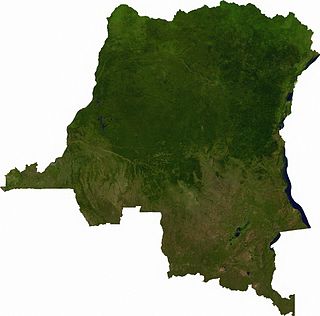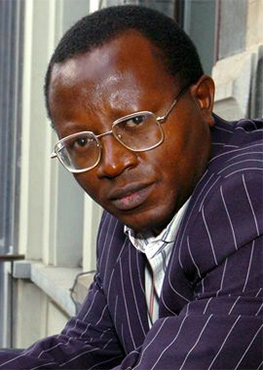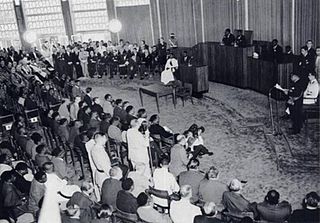The earliest known human settlements in what is now the Democratic Republic of the Congo have been dated back to the Middle Stone Age, approximately 90,000 years ago. The first real states, such as the Kongo, the Lunda, the Luba and Kuba, appeared south of the equatorial forest on the savannah from the 14th century onwards.
The Armed Forces of the Democratic Republic of the Congo is the state organisation responsible for defending the Democratic Republic of the Congo. The FARDC was rebuilt patchily as part of the peace process which followed the end of the Second Congo War in July 2003.

Congolese music is one of the most influential music forms of the African continent. Since the 1930s, Congolese musicians have had a huge impact on the African musical scene and elsewhere. Many contemporary genres of music, such as Kenyan Benga and Colombian Champeta, have been heavily influenced by Congolese music. In 2021, Congolese rumba joined other living traditions such as Jamaican reggae music and Cuban rumba on UNESCO's "intangible cultural heritage of humanity" list.

The Second Congo War, also known as Africa's World War or the Great War of Africa, was a major conflict that began on 2 August 1998 in the Democratic Republic of the Congo (DRC), just over a year after the First Congo War. The war initially erupted when Congolese president Laurent-Désiré Kabila turned against his former allies from Rwanda and Uganda, who had helped him seize power. Eventually, the conflict expanded, drawing in nine African nations and approximately 25 armed groups, making it one of the largest wars in African history.
Antoine Ghonda Mangalibi was the foreign minister of the Democratic Republic of the Congo from June 30, 2003, until July 23, 2004.

François Luambo Luanzo Makiadi was a Congolese singer, guitarist, songwriter, bandleader, and cultural revolutionary. He was a central figure in 20th-century Congolese and African music, principally as the bandleader for over 30 years of TPOK Jazz, the most popular and influential African band of its time and arguably of all time. He is referred to as Franco Luambo or simply Franco. Known for his mastery of African rumba, he was nicknamed by fans and critics "Sorcerer of the Guitar" and the "Grand Maître of Zairean Music", as well as Franco de Mi Amor by female fandom. His extensive musical repertoire was a social commentary on love, interpersonal relationships, marriage, decorum, politics, rivalries, mysticism, and commercialism. In 2023, Rolling Stone ranked him at number 71 on its list of the 250 Greatest Guitarists of All Time.

Étienne Tshisekedi wa Mulumba was a Congolese politician and the leader of the Union for Democracy and Social Progress (UDPS), formerly the main opposition political party in the Democratic Republic of the Congo (DRC). A long-time opposition leader, he served as Prime Minister of the country on three brief occasions: in 1991, 1992–1993, and 1997. He was also the father of the current President, Felix Tshisekedi.
Ernest Wamba dia Wamba was a prominent Congolese academic and political theorist who became a commander of the Kisangani faction of the rebel Rally for Congolese Democracy during the Second Congo War.

Antoine Gizenga was a Congolese (DRC) politician who was the Prime Minister of the Democratic Republic of the Congo from 30 December 2006 to 10 October 2008. He was the Secretary-General of the Unified Lumumbist Party.

Nzanga Mobutu is a Congolese politician. A son of the long-time President Mobutu Sese Seko, he served in the government of the Democratic Republic of the Congo from 2007 to 2011, initially as Minister of State for Agriculture and subsequently as Deputy Prime Minister for Basic Social Needs and Deputy Prime Minister for Labor, Employment and Social Security. He received the fourth-highest number of votes in the 2006 presidential election. In 2007, Nzanga founded the Union of Mobutist Democrats as the successor to his father's Popular Movement of the Revolution and has led the party since.

Articles related to the Democratic Republic of the Congo include:
Members of the National Assembly elected for the 2006-2011 term were as follows:

Floribert Chebeya Bahizire was a leading Congolese human rights activist in the Democratic Republic of the Congo, hailed by the United Nations as "a champion of human rights". His death led to calls for an investigation from more than 50 organisations, including Amnesty International and Human Rights Watch, many countries and several senior UN officials, including Ban Ki-moon, Navi Pillay, Alan Doss and Philip Alston.

Emmanuel Dungia was a diplomat of the Democratic Republic of Congo (DRC) and author of the political book: Mobutu and the money of Zaïre: the revelations of a diplomat, former Secret Services agent. The latter includes the report prepared for the International Monetary Fund by Erwin Blumenthal, former Director of Foreign Affairs of the Bundesbank. Dungia was also imprisoned but was eventually acquitted by the Congolese government for his alleged involvement in a plot to overthrow Laurent Kabila who was assassinated 16 January 2001.

The Belgo-Congolese Round Table Conference was a meeting organized in two parts in 1960 in Brussels between on the one side representatives of the Congolese political class and chiefs and on the other side Belgian political and business leaders. The round table meetings led to the adoption of sixteen resolutions on the future of the Belgian Congo and its institutional reforms. With a broad consensus, the date for independence was set on June 30, 1960.

The Speech at the Ceremony of the Proclamation of the Congo's Independence was a short political speech given by Patrice Lumumba on 30 June 1960 at the ceremonies marking the independence of the Republic of Congo from Belgium. It is best known for its outspoken criticism of colonialism.

Félix Antoine Tshisekedi Tshilombo is a Congolese politician who has been the president of the Democratic Republic of the Congo since 24 January 2019. He is the leader of the Union for Democracy and Social Progress (UDPS), the DRC's oldest and largest party, succeeding his late father Étienne Tshisekedi in that role, a three-time Prime Minister of Zaire and opposition leader during the reign of Mobutu Sese Seko.

The Ministry of Justice and Human Rights of the Democratic Republic of Congo (Congo-Kinshasa) has the following duties:
Order of the National Heroes Kabila-Lumumba is the highest order of the Democratic Republic of the Congo (DRC). It is awarded to Congolese nationals and foreigners who have rendered merits and loyal services to the nation. The order was instituted in 2002 as a replacement for the National Order of the Leopard. It is named after President Laurent-Désiré Kabila and Prime Minister Patrice Lumumba, both of whom were assassinated while in office.
The Palais de Marbre, also known as Marble Palace, is a palace and historic building in Kinshasa, Democratic Republic of the Congo, situated atop a hill in the Ngaliema Commune within the residential neighborhood of Ma Campagne, located a few miles from Mont-Fleury. The complex serves as a guest residence during specific official visits and is accessible to the general public, housing an exhibition that chronicles the history of Laurent-Désiré Kabila's assassination.













